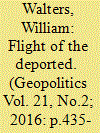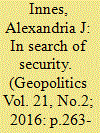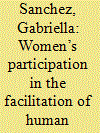|
|
|
Sort Order |
|
|
|
Items / Page
|
|
|
|
|
|
|
| Srl | Item |
| 1 |
ID:
146085


|
|
|
|
|
| Summary/Abstract |
This article is an analysis of Afghan migrants’ journeys to Turkey. The journey is defined as a form of narrative constructed by migrants encompassing long periods of immobility punctuated by shorter instances of travel. This conceptualisation of journey helps transcend the dichotomies associated with the journey such as origin and destination. The article first documents the conditions and nature of irregular travel of Afghan migrants to Turkey focusing particularly on the section of travel between Iran and Turkey. It demonstrates that the arrival of most participants to Turkey had been preceded by non-linear travel that involves uncertainty and long periods of immobility. The article then focuses on the role of journeys in the migration process, specifically as a form of narrative and a space for transformation. The construction of narratives on the journey is also important both as a skill and an agentic action that gives meaning to the migration process as a whole. Finally, the transformative potential of the journeys for participants is illustrated both in terms of the impact of the journey on migration decisions in Turkey and the ability to acquire and demonstrate different skills and autonomy.
|
|
|
|
|
|
|
|
|
|
|
|
|
|
|
|
| 2 |
ID:
146083


|
|
|
|
|
| Summary/Abstract |
The world has turned its attention to the long and dangerous journeys undertaken by migrants.1 Not a week goes by without media reports of migrant boats capsizing in the Mediterranean and corpses washing ashore; of the tens of thousands of Middle-Eastern and African migrants who trek across the Balkans or Turkey to reach the European Union (EU); on the other side of the globe, of Asian trafficking and smuggling networks that span multiple countries or even continents; of people dying in hidden compartments in trucks or transport containers; or of the deteriorating human rights situation confronting Central Americans crossing Mexico to arrive in the United States (US).
|
|
|
|
|
|
|
|
|
|
|
|
|
|
|
|
| 3 |
ID:
146092


|
|
|
|
|
| Summary/Abstract |
This article calls for studies of migration, borders and deportation to bring the practices and dynamic spaces of transportation more fully into the research frame. While modern deportation is unthinkable without vehicles, transport is a black box for the interdisciplinary literature on the state-enforced movement of population. This article focuses on deportation by air and engages largely with policies and practices relating to the UK deportation experience. It has two aims. First, to offer a critical analysis of the techniques and tactics that are used to turn commercial and charter flights into machineries of deportation. Second, to show that aviation is not a mere instrument that puts deportation policy into practice, but, like other material places in the deportation and detention world, an irreducible zone of knowledges, tactics, and politics. A proper understanding of the deportation complex is radically incomplete without an account of the mobile places of transportation.
|
|
|
|
|
|
|
|
|
|
|
|
|
|
|
|
| 4 |
ID:
146084


|
|
|
|
|
| Summary/Abstract |
This article explores a performative conceptualisation of security, foregrounding the experiences of an asylum seeker from Ghana in Greece, named Sonny. This article follows Sonny’s search for security, analysing both his journey to Greece and to refugee status (something that he was still waiting for) and the narrative through which he told his story to me. I argue that Sonny’s search for security illustrates how security might be produced by security-seeking actions performed by an agent other than the state. It accesses security on an ontological level that is performative in that security is constituted through actions, and is known through attending to experience. This security allows for incorporation of intersectional identities, subaltern identities and diverse experiences. The argument is situated in the context of migration and the migrant journey as offering unique scope for analysis in international relations that is capable of moving beyond the state. It briefly surveys the human security and feminist security literatures to elaborate on the value of conceptualising security as a practice and as an experience of everyday life, rather than an object to be obtained. To offer purchase on the performative conceptualization of security narrative analysis foregrounds Sonny’s agency to seek security, juxtaposing his feeling of security and process of security with the material security that was provided to him as an asylum seeker in Greece.
|
|
|
|
|
|
|
|
|
|
|
|
|
|
|
|
| 5 |
ID:
146088


|
|
|
|
|
| Summary/Abstract |
Based on testimonials of migration journeys of indigenous Cañaris from southern highland Ecuador, this paper examines strategies of mobility and social networking employed by migrants and facilitators in the human smuggling market. Following a series of economic crises in the late 1990s, Ecuadorian transnational migration increased significantly, with a 55.5 percent increase to the United States between 2000 and 2008, and staggering 12,150 percent increase to Spain between 1998 and 2005. This article focuses on the growth of a regional migration industry in the southern highland region, and pays special attention to the roles of indigenous Cañari migrants and migration merchants. The guiding questions are: how does indigeneity figure in mobility strategies; in what ways is indigenous identity strategically employed in the migration journey; and how might indigenous migration merchants contribute to the expansion of migration? As migration routes become increasingly dangerous, migrants and human smuggling actors employ more innovative and riskier strategies. I contend that while indigenous identity may be used strategically and allow migrants to forge new transnational social networks, indigenous migrants struggle for legibility in the face of ethnic and linguistic discrimination, in communities of origin, along migratory routes, and in migration destinations.
|
|
|
|
|
|
|
|
|
|
|
|
|
|
|
|
| 6 |
ID:
146091


|
|
|
|
|
| Summary/Abstract |
Acts of mobility require corresponding acts of immobility (or suspended mobility). Migrant journeys are not only about movement. Indeed, in the present policy context, this is ever more true. Whether a migrant is contained within a hidden compartment, detained by migration authorities, waiting for remittances to continue, or marooned within a drifting boat at sea, these moments of immobility have become an inherent part of migrant journeys especially as states have increased controls at and beyond their borders. Migrants themselves view this fragmentation – the stopping, waiting and containment – as part of the journey to be endured. Drawing on the authors’ fieldwork in Central America and Southern Europe, this paper destabilises the boundary between transit and settlement, speaking to a larger policy discourse that justifies detentions and deportations from the United States and countries on the periphery of Europe. We argue that migrants’ nested experiences of these ‘matryoshka journeys’ reveal how increased migration controls encourage them not only to take greater risks during the journey, but also to forfeit their agency at opportune moments. In turn, states exploit images of such im/mobility during the journey in order to emphasise the irrational risks migrants take in order to traverse seas and deserts and to cloak their own border policies in a humanitarian discourse of rescue.
|
|
|
|
|
|
|
|
|
|
|
|
|
|
|
|
| 7 |
ID:
146086


|
|
|
|
|
| Summary/Abstract |
Research on irregular migrants’ political mobilisation focuses particularly on Western countries, conceptualised as final destinations for migrants, and documents how irregular migrants claim rights despite high risks involved. Based on a qualitative research in Morocco, the article explores the conditions under which individual journeys, allegedly to Europe, give rise to political activism by irregular migrants. Thus, it contributes to the literature on irregular migrants’ political mobilisation as well as on clandestine journeys. Morocco, identified with “transit migration” at the periphery of the EU, has been subjected to the externalisation of EU migration policies since the early 1990s. Taking a critical approach to the concept of “transit country”, the article highlights the implications of the term on migrants’ lived experiences of the journey and of settlement, which have encouraged a pro-regularisation movement in Morocco. Facing violent practices, sub-Saharan migrants established informal associations and forged alliances with emerging local and transnational civil society actors. The framing of migrants’ demands in relation to the Moroccan democratisation process, African identity, and the Moroccan emigration experience reinforced such alliances and their demands of regularisation. As a partial response to emerging critiques, the Moroccan government announced a new migratory approach and a regularisation campaign implemented throughout 2014. The analysis of migrant mobilisation in Morocco thus provides an important case to trace processes enabling irregular migrants to gain political voice, even in contexts where irregular migration is highly criminalised and stigmatised.
|
|
|
|
|
|
|
|
|
|
|
|
|
|
|
|
| 8 |
ID:
146089


|
|
|
|
|
| Summary/Abstract |
This paper examines some of the intimate, embodied and affective dimensions of mobility for unauthorised Central American migrants in Mexico. While in transit, migrants become implicated within the violence of local and transnational economies of smuggling, organised crime, kidnapping and securitisation. At the same time, migrants engage intimate economies of exchange, kinship and care as they negotiate their movements and their lives. Bringing together ethnographic research and transnational feminist scholarship, this paper reconceptualises human smuggling as a form of intimate labour along migrant routes. I pay particular attention to the ways human smuggling becomes a point of closeness and intimate exchange as migrants and their smugglers strategically re-imagine the borders of kinship. While the types of social relations forged along the journey may defy traditional understandings of smuggling as inherently exploitative, I also examine how such arrangements contribute to new forms of inequality. Through a lens of intimacy, this work contributes new insights on the complex and shifting nature of Mexico’s human smuggling industry and the state policies purportedly aimed to contain it.
|
|
|
|
|
|
|
|
|
|
|
|
|
|
|
|
| 9 |
ID:
146087


|
|
|
|
|
| Summary/Abstract |
Accounts of migration journeys are often situated after an emigrant crosses the international border and becomes an immigrant. Yet, journeys to the border require planning and preparations, a kind that may include little or no packing, farewells to loved ones for an indefinite period of time, and a reorganisation of a past and immediate present for an uncertain future. Along with planning, there is a fracturing and disruption that unfolds before the physical journey begins. Once a decision to physically migrate is made, an important transformation takes place. Some migrants, such as children, have little involvement in the planning yet still begin their journey before arriving at the border, namely when they are told of their imminent departure. For Mexican teenage girls raised in transnational families, a decision to migrate is made for them. It is the moment of telling and its impact on their lives that this article aims to capture.
|
|
|
|
|
|
|
|
|
|
|
|
|
|
|
|
| 10 |
ID:
146090


|
|
|
|
|
| Summary/Abstract |
Despite the central role of human smuggling in irregular migration, empirical research on the practice and its facilitators has been scant. Drawing from ethnographic observations and data present in court cases, this essay explores the roles of women at providing human smuggling services in Phoenix, Arizona, which by the turn of the twenty-first century became one of the US main hubs for irregular migration. While frequently overlooked within the mainstream rhetoric of smuggling dominated by male-centred narratives of exploitation, victimisation and violence, women play fundamental roles in the facilitation of irregular migration. They recruit customers, negotiate fees and payment plans; withdraw smuggling payments from banks and wire transfer stores, care for migrants and drive or guide groups of border crossers through the desert. This essay argues, in line with recent anthropological scholarship on precarious forms of labour present under globalisation, that the facilitation of irregular migration constitutes for its participants a valid, legitimate form of labour. Smuggling actors are neither predators nor victimisers, but rather ordinary people experiencing the tensions abundant in the precarity of contemporary, neoliberal life.
|
|
|
|
|
|
|
|
|
|
|
|
|
|
|
|
|
|
|
|
|